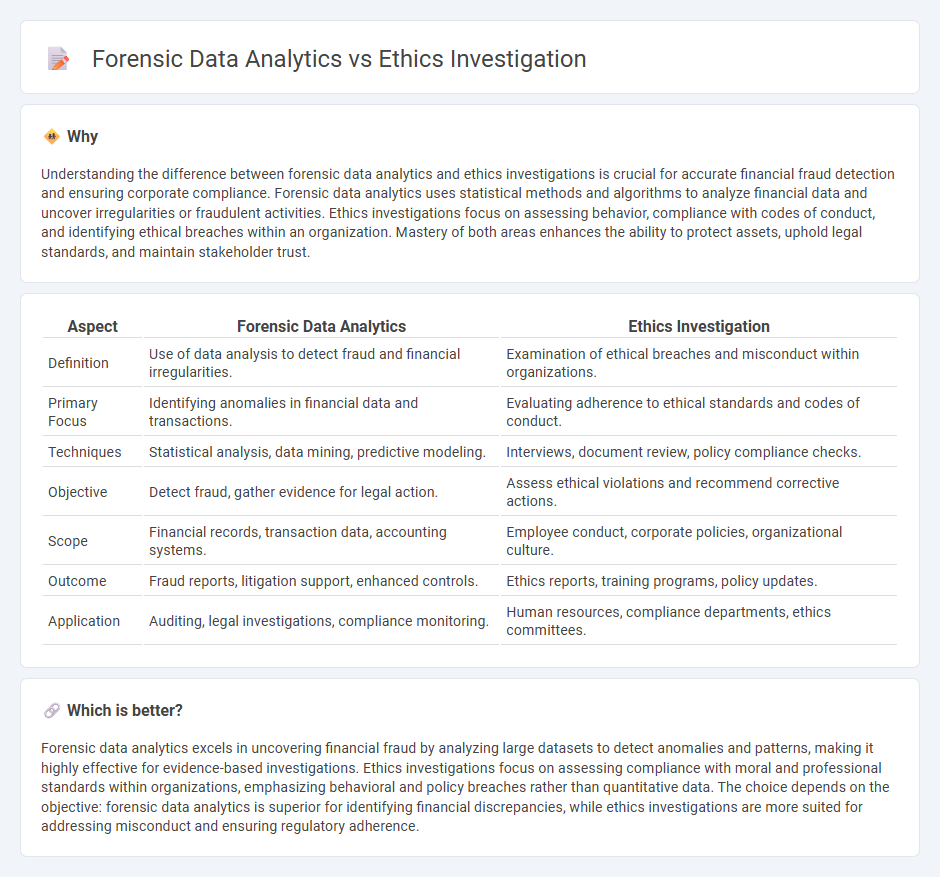
Forensic data analytics in accounting involves examining financial data to detect fraud, errors, and irregularities by applying statistical and analytical techniques. Ethics investigations focus on ensuring compliance with regulatory standards and organizational policies to uphold integrity and transparency in financial reporting. Explore the key differences and applications of forensic data analytics and ethics investigations in accounting to enhance your understanding.
Why it is important
Understanding the difference between forensic data analytics and ethics investigations is crucial for accurate financial fraud detection and ensuring corporate compliance. Forensic data analytics uses statistical methods and algorithms to analyze financial data and uncover irregularities or fraudulent activities. Ethics investigations focus on assessing behavior, compliance with codes of conduct, and identifying ethical breaches within an organization. Mastery of both areas enhances the ability to protect assets, uphold legal standards, and maintain stakeholder trust.
Comparison Table
| Aspect | Forensic Data Analytics | Ethics Investigation |
|---|---|---|
| Definition | Use of data analysis to detect fraud and financial irregularities. | Examination of ethical breaches and misconduct within organizations. |
| Primary Focus | Identifying anomalies in financial data and transactions. | Evaluating adherence to ethical standards and codes of conduct. |
| Techniques | Statistical analysis, data mining, predictive modeling. | Interviews, document review, policy compliance checks. |
| Objective | Detect fraud, gather evidence for legal action. | Assess ethical violations and recommend corrective actions. |
| Scope | Financial records, transaction data, accounting systems. | Employee conduct, corporate policies, organizational culture. |
| Outcome | Fraud reports, litigation support, enhanced controls. | Ethics reports, training programs, policy updates. |
| Application | Auditing, legal investigations, compliance monitoring. | Human resources, compliance departments, ethics committees. |
Which is better?
Forensic data analytics excels in uncovering financial fraud by analyzing large datasets to detect anomalies and patterns, making it highly effective for evidence-based investigations. Ethics investigations focus on assessing compliance with moral and professional standards within organizations, emphasizing behavioral and policy breaches rather than quantitative data. The choice depends on the objective: forensic data analytics is superior for identifying financial discrepancies, while ethics investigations are more suited for addressing misconduct and ensuring regulatory adherence.
Connection
Forensic data analytics in accounting involves examining financial data to detect fraudulent activities and ensure compliance with ethical standards. Ethics investigations rely on these analytical techniques to uncover discrepancies and support transparent decision-making. Integrating forensic analytics enhances the accuracy and integrity of investigations, promoting accountability in financial reporting.
Key Terms
Fraud Detection
Ethics investigations concentrate on identifying violations of moral principles and corporate policies, often relying on qualitative interviews and document reviews to uncover fraudulent activities. Forensic data analytics employs advanced algorithms and data mining techniques to analyze large datasets, detecting patterns and anomalies indicative of fraud with greater precision. Explore the distinct methods and benefits of both approaches in fraud detection to enhance your organization's risk management strategy.
Evidence Preservation
Ethics investigations prioritize the careful preservation of evidence to maintain integrity and ensure compliance with legal standards, using established protocols for data handling and chain of custody. Forensic data analytics employs advanced techniques like digital forensics and metadata analysis to identify, preserve, and analyze electronic evidence, enabling precise reconstruction of events. Explore how combining these methods enhances evidence preservation in complex investigations.
Compliance Standards
Ethics investigation centers on evaluating adherence to compliance standards by reviewing employee conduct and corporate policies to identify violations or misconduct. Forensic data analytics involves analyzing large datasets using statistical and computational techniques to detect anomalies and ensure regulatory compliance. Explore the distinct methods and benefits of both approaches to strengthen your organization's compliance framework.
Source and External Links
How to Conduct Ethical Investigations - A fair, timely process involving identifying a neutral investigator, gathering and analyzing evidence, and presenting findings to management to address and prevent misconduct while respecting confidentiality and organizational policies.
The Process of an Ethics Investigation (from Start to Finish) - Triggered by credible reports of unethical behavior such as fraud, harassment, or safety violations, these investigations aim to end misconduct, uphold company standards, and reinforce a culture of integrity.
Conducting an Ethics Investigation: Top 20-Step Guide - A structured, unbiased inquiry into allegations of unethical conduct, focusing on thorough evidence collection, strict adherence to company protocols, and maintaining transparency to ensure accountability and organizational trust.
 dowidth.com
dowidth.com